|
  
|
FROM SITE
SELECTION MAGAZINE, MARCH 2022 ISSUE
|
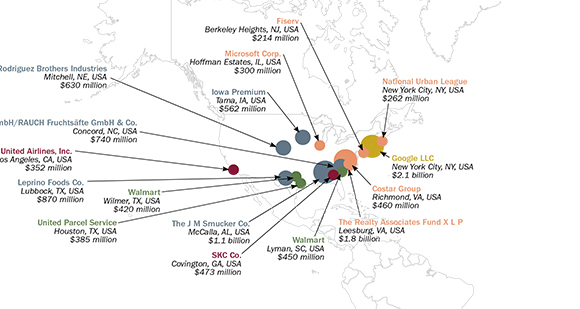 |
TOP INDUSTRIES
And the big wheels of logistics keep on turning, as we examine
trends in global facility project data from 2021.
|
|
 |
CONNECTICUT
Connecticut boosts its Innovation Corridor and the workforce to go
with it.
|
|
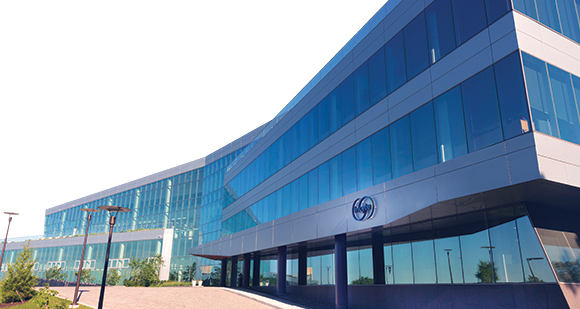 |
INVESTMENT PROFILE: DELAWARE
“Delaware made us feel wanted and that they would help us be
successful in the state,” an executive from biopharma company Incyte
tells Site Selection. “The other states did not.” Learn more about
why the First State makes sense for the company’s Wilmington HQ,
where it now employs more than 1,000 people.
|
|
|
CONWAY
ANALYTICS SNAPSHOT
|
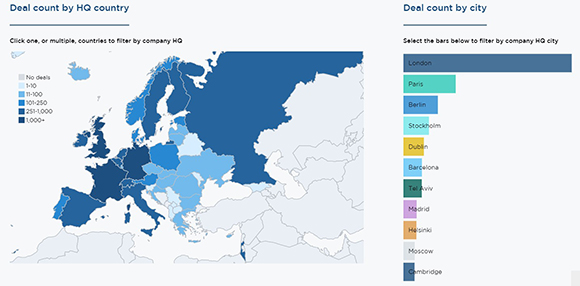
|
Two new reports issued by PitchBook this month offer insight into
venture capital funding for female-founded or female co-founded
companies in Europe and in the United States over the past 14 years.
The analysis, which will be updated monthly, features deal counts by
country or state, industry and stage. “Last year, companies founded
solely by women garnered just 1% of the total capital invested in
venture-backed startups in Europe,” one report states, while the
other notes a slightly higher but still small proportion of 2.1% in
the U.S. However, such funding has trended up in recent years, and
“2021 saw the creation of several women-led funds, incubators for
female founders and more new companies,” PitchBook says. In the U.S.
VC ecosystem, “female founders continue to exit faster and at higher
valuations than their all-male counterparts. In fact, 2022 is on
pace to be the 12th straight year that female-founded companies
exited faster than the broader market.”
|
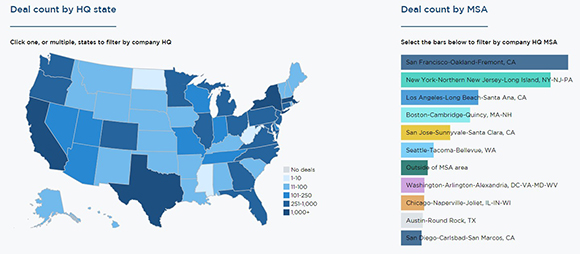
|
Maps courtesy of PitchBook
|
|
  |
|
A screen-based facsimile of the print edition complete with messages
from supporting advertisers, the March issue’s Digital Edition features the
publication’s much-anticipated Governor’s Cups, Top Metros and Top
Micropolitans rankings derived from our first chance to examine
complete data from 2021. You’ll also find the magazine’s annual look
at the world’s Top Industries based on those data, as well as the
annual Mississippi River Corridor rankings.
The March Digital Edition also includes an exclusive SITE Visit
report by Ron Starner on Intel’s $20 billion bet on Ohio; reports on
Vietnam, airport cities, agribusiness and data center location
trends; and an exclusive Q&A with the CEO of fast-growing
biopharmaceutical firm Cambrex. In addition to the Hampton Roads
Intelligence Report, you’ll also find state spotlights on
California, Georgia, Ontario, Indiana, New Mexico, Illinois, South
Carolina, Minnesota and Connecticut; and regional roundups from the
U.S. Northeast and South Central regions. And don’t miss the Site
Selection Investment Profiles about nine different territories and
organizations: San Bernardino County, California; Delaware; York
Region, Ontario; Round Rock, Texas; Hoosier Energy; Team California;
Indiana Municipal Power Agency; Conroe, Texas; and San Joaquin
County, California.
It’s 270 pages (one of our thickest issues ever) of business
intelligence you’ll find nowhere else, designed to inform how you
approach your own company’s site portfolio and location
decision-making.
|

|
|
Site
of the Week: The Manna Site, Marion County, South Carolina
|
 |
|
The North Eastern Strategic Alliance (NESA) has the absolute perfect
site for your next food processing facility.
The Manna Site in Marion County, South Carolina has been food
processing certified by Austin Consulting. This 33-acre site is pad
ready, has been through the due diligence process, and is located
within a well-established industrial park. The site sites adjacent
to 4-lane U.S. Highway 501 which carries you directly to I-95 in
roughly 15 minutes. Not to mention the site is also only 15 miles
from Inland Port Dillon, which has direct rail access to the
deepwater Port of Charleston. This site makes it extremely easy for
all of your logistical needs.
Have we piqued your interest? Take a 360-degree tour of the site by
clicking the image above. If you want to learn more contact NESA at
info@nesasc.org or at
843-661-4669.
|
|
  |
North Carolina
Amgen this week announced the groundbreaking for its newest
biomanufacturing facility, located in Holly Springs, North Carolina,
where the company expects to create more than 350 new jobs. The site
is expected to be operational by 2025. Robert A. Bradway, Amgen’s
chairman and CEO, called the state “a major hub for
biopharmaceutical innovation.” In its announcement, the company
stated, “Amgen’s selection of North Carolina was driven, in part, by
access to diverse talent. Amgen is a founding member of the OneTen
Coalition, a coalition of 35 of the world’s largest, best-known
companies which plans to use its resources to change the employment
paradigm for Blacks in the United States. The Coalition aims to hire
1 million Black Americans into good-paying, family-sustaining jobs
over the next 10 years. To achieve this goal, Amgen will work with
businesses, educational institutions, and training partners to
better develop, retain and advance diverse talent, focusing on Black
Americans without four-year college degrees.” The California-based
company employs 24,000 worldwide, with manufacturing facilities in
California, Ireland, Netherlands, Ohio, Puerto Rico, Rhode Island
and Singapore.
Georgia
Last week, Georgia Gov. Brian P. Kemp announced that vaccine and
therapeutics maker Moderna will establish a new Enterprise Solutions
Hub in Atlanta where it will create more than 150 new jobs over the
next two years. Operations are expected to begin in the second
quarter of this year. “We are pleased to be expanding our footprint
after a year of tremendous growth, which underscored the need for
business services activities in proximity to skilled talent,” said
Moderna CEO Stéphane Bancel, Chief Executive Officer of Moderna. The
state said Atlanta’s “highly skilled and diverse workforce, vibrant
business community, and growth trajectory were identified as key
factors in Moderna’s decision to locate their Enterprise Solutions
Hub in the metro area.” The operation will initially host finance,
human resources, procurement, and digital solutions. New jobs will
focus on digital/IT, finance, HR, and procurement positions.
|
|

|
BIOSCIENCE
Life sciences investments in Kansas serve global animal and human
health needs.
|
|
 |
LOGISTICS & DISTRIBUTION
When companies are looking to right-shore operations, manage costs
and bring balance to a tangled global supply chain, there’s no more
central place than Kansas.
|
|
|
SITE
SELECTION RECOMMENDS
|
|
|
|
The NAIOP Research Foundation this week released a new report that
predicts the conversion of increasingly vacant office space to meet
the need for more medical, life sciences and multifamily space. “New Uses
for Office Buildings: Life Science, Medical and Multifamily
Conversions,” was authored by Emil Malizia, Ph.D., CRE,
research professor of city and regional planning at the University
of North Carolina-Chapel Hill and president of Malizia & Associates,
LLC. “Although it is difficult to estimate the amount of office
space that will become available as long-term leases expire in the
years ahead, there will probably be an excess supply of office
buildings in most markets,” the report states. “This outcome is
leading property owners and developers to actively seek alternative
uses for these office properties. Strong demand exists for life
science lab space, medical office space and rental apartments in
many markets due in part to the continuing threat of new viruses,
chronic health conditions, an aging population and migration to
cities or from one area of the country to another.” Among the
advantages of conversions, says the report, are easier-to-obtain
permits and other approvals, lower costs for materials and labor,
and quicker project completions.
|
|
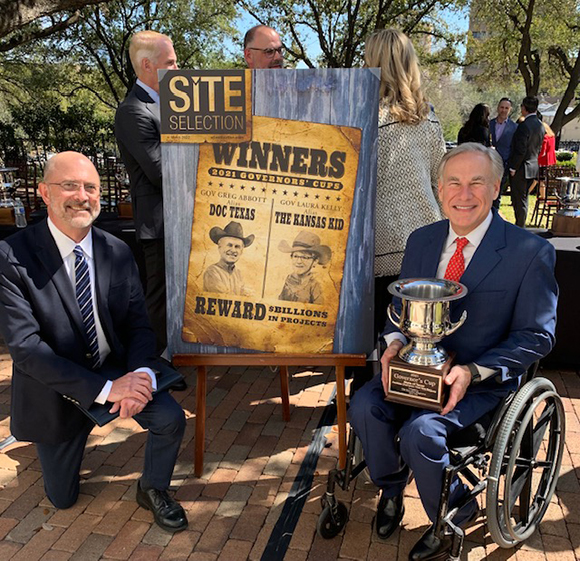
|
Editor in Chief and Vice President of Publications Mark Arend
presented the Governor’s Cup to Texas Governor Greg Abbott on March
1 in Austin. For the 10th consecutive year, Texas won the race —
this time with 1,123 qualified projects in 2021. In addition to
multibillion-dollar projects from Texas Instruments and Samsung, “we
saw a record number of headquarters moves, too,” Gov. Abbott told Site Selection.
|
|
|
|

